#fake regime
Text
Kamala Harris really said omg nooooooo I love Gen Z I LOVE them! 🥺 I speak to them on college campuses all the time! 🥰✨ I just also think they’re completely naive inexperienced stupid dumb dumb little babies who know nothing of the world and don’t understand that sometimes you HAVE to actively fund the bombing of civilians bc there’s no other choice your hands are tied 😪 we would love to stop the violence! ☮️🙏🕊️ but we have no other choice no power there’s nothing at ALL we can do 😔 Love Gen Z tho ❤️
#girl it would’ve been better fucking PR if you had kept your mouth shut the actual fuck was this#voters don’t want a fake ass statement clearly meant to placate them while offering no real change#you are losing the voter base NOT because ‘oh haha younger voters are just uninformed’#but because you are actively ignoring the massive pushback of your constituents against this administration’s complicity in genocide#hope that helps#you cannot be openly and obviously shoveling money into an apartheid regime then go ‘guys why do people think we have a hand in this 🥺’#this country is so fucking disgusting I can’t believe it#sure obviously politicians are full of shit but it’s beyond insulting for them to be actively enabling g.en.ocide#and then just telling voters they’re so silly and dumb and misinformed when they pick up on that#cape town rambles#might create a tag for current events bc I know I’ve had a few things on here like this
7 notes
·
View notes
Text


#christian yu#rome#dpr ian#yu barom#dpr#yeah hes tall i both accept and appreciate this#change my mind from the time i drafted this he is faking he is not that tall#still appreciating tho i am not mad <3#regime tour seoul
18 notes
·
View notes
Text
even though ryuji looks more the part of a ken doll, could he be more like allan lol.
#i could see him being big into the horses and the sports and enjoying getting to be a slob#but i don't think he'd buy into the ken-patriarchy regime#he loves his friends#but on the other hand#he is a himbo - and a fake blonde#like ken#one of the good kens lol?
5 notes
·
View notes
Text

Personal travel bans
Russia - because I can't keep my mouth shut about Putin. And that wouldn't sit well with me over there.
Afghanistan - because I couldn't overlook the discrimination against women. And I didn't want to.
Saudi Arabia - because I despise their system. Even if it is against Iran.
Iran - because I despise their system. Even if it is against Saudi Arabia.
North Corea - because I couldn't get in. And even if I could, I couldn't get out afterwards.
Nigeria - because it's way too dangerous. But I wouldn't actually want to travel to the country.
Syria - ditto. Although I would really like to travel to the country.
China - because my attitude towards those in power would not earn me enough "social points" to be able to move around freely.
United Arab Emirates - because it's all fake.
Antarctica - because I like it warm and cozy.
#thoughts#aperçu#funny#travel#travel ban#personal#view#russia#vladimir putin#afghanistan#taliban#women rights#Saudi Arabia#iran#regime#north corea#getting out#getting in#nigeria#syria#country#china#social policy#united arab emirates#fake#antarctica#warm#cozy
0 notes
Text
like
one of the reasons (a minor reason, IOF soldiers TikToking genocide doesn't help the credibility of the other side) that Palestinian voices are so genuine is that. in any given photograph there are far fewer middle aged and old people than could ever exist outside a planned photoshoot in other countries.
they did not plan the photoshoot.
all the old people are dead.
#ties into genocidal regimes' attraction to conspiracy theories#with enough planning any fact no matter how categorically obvious can be faked#so your average genocider will choose to rationalise it all as a conspiracy#because that's essentially an insurmountable obstacle#as an addendum#“hamas controls the press”#oh I've seen this one it's a motherfucking _classic_#free palestine
0 notes
Text
What Does Latin America Think About the Israel-Hamas War?
Many Countries are Spurning Apartheid Isra-hell. But the Region’s Middle East Stance Has Always Been Nuanced.
— January 29, 2024 | By Patricia Garip | Foreign Policy
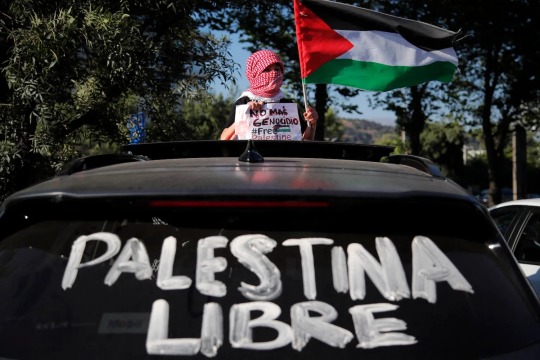
Members of the Palestinian community in Chile participate in a car caravan on the International Day of Solidarity with the Palestinian People in Santiago on November 29, 2023. Javier Torres/AFP Via Getty Images
Last November, at the start of a soccer game in Chile’s domestic league, a team called Palestino strode onto the pitch wearing keffiyehs, the iconic Palestinian scarf. Just over a month earlier, the Palestinian militant group Hamas had attacked Israel, killing 1,200 Israelis and taking more than 200 hostage. Israel’s military response in the Gaza Strip has since intensified and reverberated across the Middle East.
For many in Latin America, the gesture of solidarity by Palestino, a club founded a century ago by Palestinian immigrants in Chile, exemplified how resonant the Palestinian cause is in the region—where many people have recent memories of their own military subjugation and Indigenous dispossession.
That often translates into foreign policy: Like most of the world, Latin American countries voted overwhelmingly last year in favor of two United Nations General Assembly resolutions seeking to pause Israel’s war, which by now has killed more than 26,000 Palestinians and displaced 90 percent of Gaza’s more than 2 million residents. (Both resolutions were rejected by the United States.)
Now, key Latin American countries are spurning Israel for its war conduct while also condemning Hamas for its attack. In early January, Brazil and Colombia endorsed South Africa’s genocide claim against Israel at the International Court of Justice (ICJ), as well as Pretoria’s petition for provisional measures to stop the war and ease Gaza’s humanitarian crisis. On Jan. 18, Chile and Mexico presented a referral to the International Criminal Court to reinforce its investigation into possible war crimes and crimes against humanity in Gaza, the West Bank, East Jerusalem, and Israel. These actions have put Latin America at sharp odds with the United States and some European nations.
LATIN AMERICA HAS A LONG HISTORY of sympathy for Palestine. During the Cold War, leftist movements battling repressive U.S.-backed dictatorships were natural allies of Palestinian liberation groups. Latin American and Palestinian exiles and refugees mixed in places such as East Germany and Cuba. The Palestine Liberation Organization trained the Sandinistas in Nicaragua as well as other rebel groups.
But then as now, nuance characterized Latin America’s approach toward the Middle East. Some leftists in the region, including Jewish activists, strongly identified with Zionist Israel’s socialist roots and viewed so-called “Turcos”—Palestinians and other Levantine Arabs who arrived decades earlier on Ottoman passports—with suspicion. Among the private enterprises targeted for state seizure under former Chilean President Salvador Allende were Palestinian-owned textile factories and a bank.
As the Cold War ended, Israel sought greater acceptance in Latin America. It courted the region’s Christian evangelicals and fragile governments in need of military equipment. That courtship only went so far. In the past year, Israel has veered solidly to the right, while much of Latin America has recently lurched to the left.
“A lot of young people in Latin American governments today … come from a background of activism in left-wing movements that identify with the Palestinian struggle,” said Alex Main, the international policy director at the Center for Economic and Policy Research in Washington.
This shift is evident in Colombia, a country that the Biden administration designated a major non-NATO ally. Gustavo Petro, Colombia’s first left-wing president, who took office in 2022, regularly criticizes Israel and the United States despite decades of military cooperation with both countries that was established by his conservative and centrist predecessors.
In October 2023, when Israeli Defense Minister Yoav Gallant vowed to deny food, water, fuel, and electricity to Gaza and compared Hamas fighters to “animals,” Petro drew a comparison to Nazi Germany’s treatment of Jews—earning a rebuke from Washington and an Israeli pledge “to stop security exports to Colombia.”
So far, there is no evidence that this has happened, said Wilder Alejandro Sánchez, the president of defense consultancy Second Floor Strategies in Washington; “I think Colombia’s Defense Ministry is hoping the media forgets the scandal so it can conduct business as usual with Israel,” he told Foreign Policy. But with Petro in office and Israel’s war in Gaza grinding on, that could prove difficult.
Other countries’ official postures have seesawed over time. In Argentina, the inauguration of new libertarian President Javier Milei—who harbors a deep affinity for Judaism and Israel—reflected a shift away from the stance of his leftist predecessor, whose government supported the first proposed U.N. cease-fire resolution before leaving office.
Argentina, home to Latin America’s largest Jewish community, has more emotional bonds to Israel than many of its neighbors. These intensified after a 1994 bombing of a Jewish community center in Buenos Aires that the U.S. government blamed on Iran-backed Hezbollah. (U.S. federal prosecutors recently charged a member of the group with helping plan the attack.) Some Argentinians are among the hostages remaining in Gaza.
But the Palestinians evoke sympathy here, too. In an Oct. 17, 2023, open letter to U.N. Secretary-General António Guterres, Argentinian Nobel Peace Prize winner Adolfo Pérez Esquivel accused Israel of genocide, called on the U.N. to create a humanitarian corridor into Gaza, and urged Hamas to release the hostages. In neighboring Uruguay, former President Pepe Mujica—another influential voice on the left—said that “Hamas wasn’t created by the Holy Spirit,” alluding to the ways in which Israeli policy helped fuel the rise of the group as a strategy to divide Palestinians. He also blamed fanaticism on both sides for crushing hopes for a Palestinian state.
In Brazil, far-right former President Jair Bolsonaro was an ally of Israel. (Bolsonaro’s evangelical Christian wife sported a T-shirt emblazoned with the Israeli flag to the polls in 2022.) But during Brazil’s October 2023 stint as the rotating president of the U.N. Security Council, Bolsonaro’s leftist successor, Luiz Inácio Lula da Silva, said Gaza is “not a war. It’s a genocide” and pressed for a cease-fire resolution, only to be rebuffed by the United States.
In Mexico, the outgoing López Obrador administration’s support for the Palestinians has been tempered by its need to maintain cooperation with Washington on bilateral priorities such as immigration. Mexico City is also eager to win extradition from Israel of a Mexican fugitive tied to a 2014 massacre in the state of Guerrero. A handful of smaller Latin American countries transferred their embassies from Tel Aviv to Jerusalem to curry favor with the United States and Israel, following in the Trump administration’s footsteps.
Still, in Latin America’s equation, “the overall sum of the spectrum does not favor Israel,” said Sarang Shidore, the director of the Global South Program at the Quincy Institute, a Washington-based think tank.
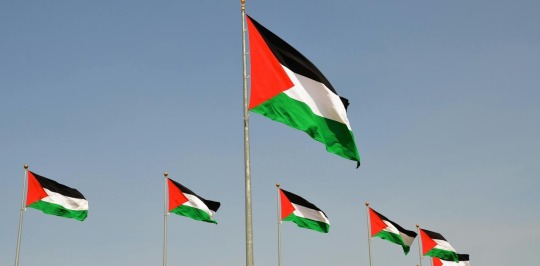
Flags of “Love For All: Forever Palestine 🇵🇸!”
IN CHILE, PRO-PALESTINIAN ACTIVISM could strain relations with the United States. It wouldn’t be the first time that Santiago stands up to Washington over its Middle East policy. In 2003, Chile refused to endorse a U.N. Security Council resolution authorizing the U.S. war in Iraq.
This time, in late October 2023, the Chilean government withdrew its ambassador from Tel Aviv, and Colombia and Honduras followed; Bolivia—also run by a left-wing government—cut ties with Israel altogether. As the war continued into the new year, the administration of Chilean President Gabriel Boric endorsed the ICJ’s Jan. 26 order for Israel to prevent acts of genocide and allow more aid into Gaza, as well as for other provisional measures to be taken while the court considers the merits of the genocide claim, a process that will take years.
Half a million Chileans have Palestinian roots, mostly in historically Christian villages around Bethlehem. Prominent Palestinian surnames appear in banking, commerce, politics, sports, and the arts. For more than a decade, Chilean politicians—including Boric, when he was serving in Congress—have traveled to the Palestinian territories and seen firsthand Palestinians’ plight under occupation. Center-right former Chilean President Sebastian Piñera recognized Palestinian statehood in 2011.
Boric has tilted further toward the Palestinians than his predecessors, even refusing to receive the credentials of Israel’s new ambassador in 2022. He recently described Gaza as “worse than Berlin in 1945.” In response, Chile’s Jewish community recently bowed out of participating in the government’s annual Holocaust commemoration. In an interview with Foreign Policy, Carolina Valdivia, Chile’s former deputy foreign minister, questioned Boric’s coherence on human rights given the administration’s tepid action on Cuba and Venezuela. “If human rights is a matter of principle, what about these other cases?” she asked.
But veteran Chilean ambassador Nelson Haddad, who is of Palestinian descent and heads a group of 100 Chilean attorneys that filed a war crimes claim against Israeli leaders at the International Criminal Court last December, backed Boric. “By defending Palestinian rights, the president is respecting a pillar of Chile’s foreign policy, the defense of human rights everywhere,” he told Foreign Policy.
Chile’s Palestinian advocacy is likely to hit a wall soon, however—thanks partly to Washington. In early January, the Chilean Senate’s human rights commission approved a bill banning companies from importing goods produced in Israeli settlements in the occupied territories. The revived proposal for a boycott, one of the world’s first, was derived from a list of more than 100 Israeli businesses tied to settlements that was issued in 2020 by then-U.N. High Commissioner for Human Rights—and former Chilean President—Michelle Bachelet in a response to a 2016 request from the Human Rights Council.
The boycott is not directed at Israel itself, but rather at companies that do business in illegal settlements, and it is consistent with Chile’s overall commitment to human rights, one of the bill’s top supporters, conservative Sen. Sergio Gahona, told Foreign Policy. “We can’t permit companies that violate human rights by producing goods in illegally occupied territories to bring those goods into our country.”
The boycott would be largely symbolic for Chile. But the United States, a top Chilean trading partner, has conveyed its reproach for the bill—and the “global Boycott, Divestment, and Sanctions movement for unfairly singling out Israel,” a State Department spokesperson said, adding that “We have made this clear in Chile.”
Whatever happens with the measure, Washington and its European allies will have a harder time quashing perceptions of hypocrisy in Latin America and the global south more broadly. Yale University international law professor Oona Hathaway said that the United States and Europe “talk this great game about the importance of international law, and yet they are only holding some states to account and not others.”
By eroding trust, these inconsistencies could impede a range of Western geopolitical goals. It will be more difficult to win cooperation with Latin America on combatting climate change, redrawing strategic supply chains away from China, and keeping up international pressure on Russia over its war in Ukraine.
In the global south’s view of the latter, Hathaway told Foreign Policy, “picking sides means making an enemy of a very powerful state … so why should countries put themselves at risk for a set of ideals that will just be ignored the next time around?”
Perceived double standards in the West’s treatment of Russia and Israel for alleged human rights violations exemplify the case. One reason that countries in the global south have latched onto the unfolding international legal claims against Israel, Hathaway added, is that they offer an opportunity “to show that there isn’t a double standard, to actually hold Israel to account if, in fact, what it’s doing is in violation of international law.”
— Patricia Garip is a Freelance Journalist based in Chile 🇨🇱.
#Chile 🇨🇱 | Gaza | Forever Palestine 🇵🇸 | Genocide & Crimes Against Humanity | Human#Human Rights | ICC | Illegal Regime of Apartheid Isra-hell | Law | North America | Forever Palestine 🇵🇸#South America | War#Bastard Child of the US 🇺🇸 and the West 🇪🇺#Genocidal Crimes of the European Immigrant Fake Jews#God’s Cursed Terrorist Zionist 🐖 🐷 🐖 Cunts
0 notes
Text
im always reminded of that one tweet that explained, the power of dictatorships is less about enforcing laws and being successful in censoring the shit out of you, but about enforcing the most ridiculous shit on earth, mud-stuck-on-wall degree of shit, the kind everyone with two braincells is aware is shit and ridiculous and hysterical, and enforcing it succesfully. its not about whether a state truly believes in their policies or their mission, its not even about whether they believe (and care about) that the public, the citizens, believe it. its about enforcing, and enforcing it successfully. its about the fact that they know you know and can still do it. thats the power.
#an absolute regime has power when it can make you do things you know are stupid and bad and you can do nothing about it#its about. keeping that illusion even though everyone knows its fake.#its about. making you into a clown and youre forced to thank them for it#we live in a Society#many thoughts tonight.#that means its not about maintaining an illusion. its about maintaining power over your life.#im always so raw when im reading stuff about censorships.#like on one hand its hard for me to understand.#i grew up in a free country that values its citizens. its always an exercise for me to contextualize whats going on there.#on the other i have this legacy where two generations of my mother's side lived through dictatorships.#i grew up in a free country but raised by people who never were free and continue to live in that period of their life mentally#so its. its making me so fucking raw#talking to the moon
0 notes
Text
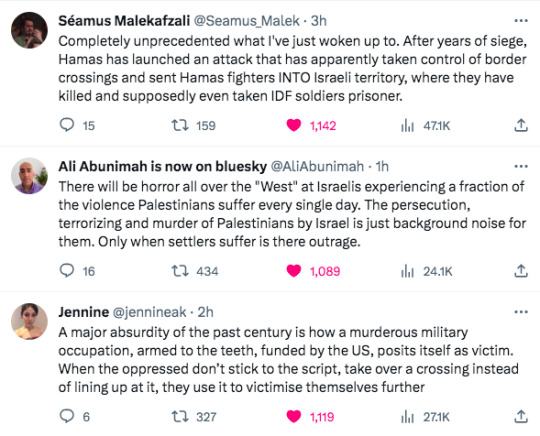

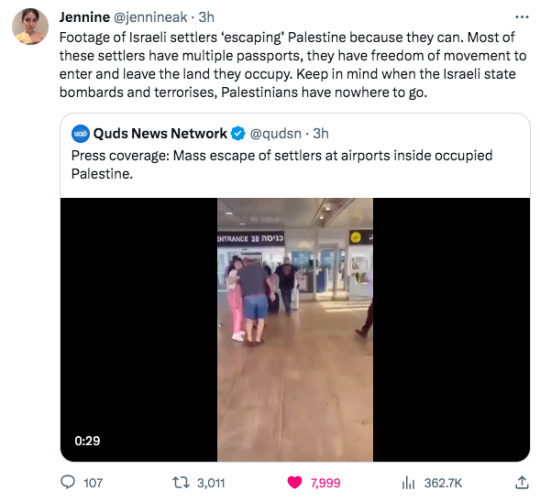
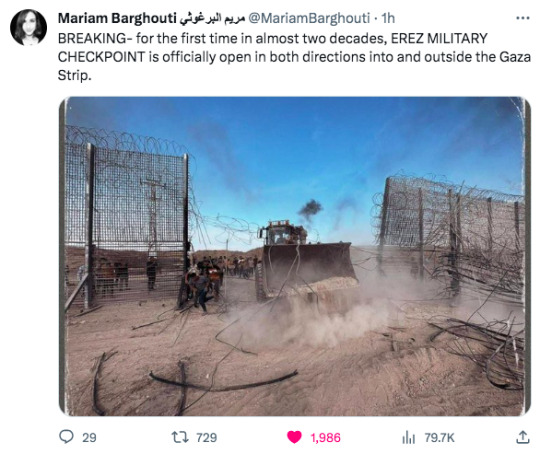
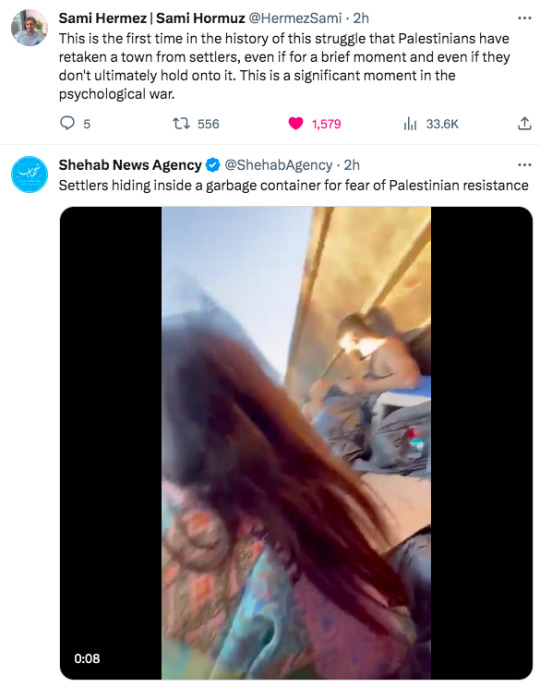
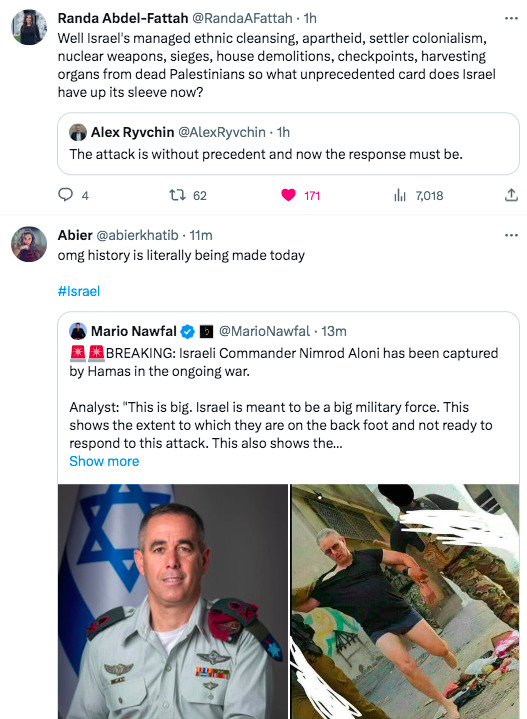
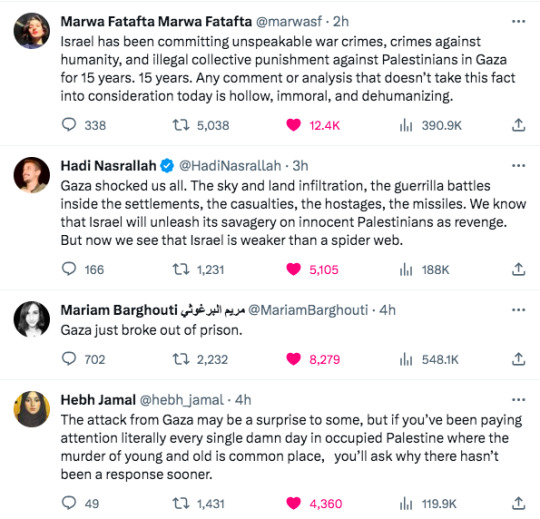
Woke up to the beautiful news of Palestinians in Gaza stripe (over 70% of whom are refugees forced to live in Gaza after being ethnically cleansed from other parts of Palestine by Israel) breaking out of the illegal Israeli blockade on them for the first time in almost 2 decades and reclaiming stolen Palestinian land for the first time in 7 decades while making the illegal settlers squatting in Palestinian houses rush to the airport and fly back to their home countries that they came to Palestine from in the first place or hide in the trash container where they belong.
They did all of this without having a formal military and reusing Israeli weapons that were used against them and I know without a doubt that hypocritical western media and politicians will come out with fake crocodile tears to show sympathy to Israel and claim that they have the right to defend themselves against "terrorist" Palestinians, even though what is happening to them today isn't a fraction to what they have been doing to Palestinians for 70 years straight and that if anyone is defending themselves here, its the refugees forced to live in the world's biggest open-air prison, not their occupiers.
I don't know what will happens next, I wouldn't be surprised if Israel used their funded-with-billions-from-the-US military power to steal back all the land Palestinians reclaimed, re-install the apartheid wall to continue the illegal blockade on Gaza as well as perform collective-punishment on as many Palestinian civilians as possible as revenge on the humiliation they suffered, all while calling themselves the victims and the people they're killing/occupying the terrorists.
Either ways today was a big day in the decolonization of Palestine and a huge blow to the settler-colony of Israel's regime and ego, hopefully it will encourage some of the settler to leave Palestine for good and discourage new settlers from coming to Palestine from other parts of the world.
-
Palestinians made a document that contains templates for letters to US, UK, & Canadian politicians, media outlets, and companies in relation to current events in Palestine as well as petitions & other resources. If you live in any of these countries then please select a template, edit it to your preference and send according to the instructions on the relevant page.
Here is a link to it (please share it): https://docs.google.com/document/d/1-RUOHHiEtr7uoclQgWN-tCWOihnHIp5hym89aNePi_E/mobilebasic
Aside from that, please protest, support the BDS boycott and spread awareness as much as possible.
#palestine#gaza#palestinian#palestinians#anti zionist#anti zionists#anti zionism#anti israel#anti israeli#anti israelis
3K notes
·
View notes
Text
I just saw a picture of hanged people on a Russian news page. «Предатели луганского народа». Ukrainians. Young men (?) in civil clothing. With bags on their heads. One’s trousers were stained with blood. «Он передавал сведения врагу. СМЕРШ». Humans are capable of the worst. Hanging, from the ceiling inside a cluttered shed. Loss for words
#the article is a description of how the Ukrainians#e Ukrainians supposedly faked this.#I mean ok. We don’t have an absolutely certain truth.#But first you say there’s not enough proof that the pro Putin regime in Luhansk did this.#And then u immediately explaining how exactly the Ukrainians faked it to gain support from the West. w/o any proofs whatsoever.#*start#journalistic standards 💯
0 notes
Text
the queen dying and all the varying reactions to it are the funniest shit that happened this year but i guess the bar wasnt that high either
#british people acting like all the mourning is fake and no one likes the monarchy while people wait 24h to see a coffin#my uni released a statement that they wont be posting on 19th out of respect#and some dude under that post commented yeah lots of uni staff are actually anti-royalist and even anti-uk which is why he left his course#meanwhile my ex employer is offering 2 kebabs for price of one on uber eats#and people comparing uk to like authoritarian regimes bc people are 'forced' to watch the funeral xdddddd
0 notes
Text
[The Economist is Private UK Media]
Making someone do porridge (or “eat rice and beans”, to use the Korean expression) for expressing their political views is [...] not generally associated with [South Korea]. Yet Lee Yoon-seop, a South Korean poet, is currently languishing in prison for just this. The 68-year-old was sentenced to 14 months in November for threatening South Korea’s “existence and security”. His crime? Writing a poem in praise of the North.
The law used to prosecute Mr Lee, the National Security Act (nsa), is designed to protect South Korea from spies and traitors. But it also bans South Koreans from visiting or making contact with the North, reading or watching North Korean media or saying anything good about Kim Jong Un’s [...] regime. Though South Korea replaced its former military dictatorship with a democracy in 1987, such restrictions on free speech show that some of the generals’ autocratic tendencies endure.[...]
The NSA was modelled on a law designed to quash pro-independence activities during Japan’s occupation of Korea from 1910 to 1945. Since 2003 there have on average been more than 60 NSA prosecutions a year, often for pretty clear espionage cases. A businessman and an army officer were arrested for allegedly selling military secrets to North Korea. Soldiers in the South have been prosecuted under the act for endangering morale by distributing pro-North propaganda.
But the NSA is too often used to prosecute satirists and raid the homes and offices of leftists. Some cases have been ridiculous. Kim Myeong-soo, a PhD student, received six months in prison and a two-year suspended sentence for selling books on North Korea that were widely available in public libraries. A South Korean woman was given a two-year sentence, suspended for four years, for owning recordings of 14 North Korean songs.
This is not Mr Lee’s first offence. But the claim that the sexagenarian posed a threat to South Korea is absurd. His ode was published on a North Korean website. Access to such sites is banned by the NSA and forbidden from a South Korean IP address. [...] It consists of a list of South Korean problems that Mr Kim, in the poet’s view, would instantly solve given the chance.
Mr Lee’s real offence appears to have been believing his own nonsense. By contrast, police decided not to investigate a man under the draconian law for selling shirts with a smiling Mr Kim and the slogan “Walk a flowery path, comrade”. That was OK, officials said, because he was selling them to make a buck.
Worse, the issue points to a broader authoritarian tendency in the South. Its president, Yoon Suk-yeol, often demonises his political opponents by calling them “anti-state forces”, a phrase lifted directly from the NSA. Unfavourable press coverage is routinely labelled “fake news” and the offices of offending outlets have been raided. The administration and its allies have sued more press outfits for defamation—which in South Korea can be a crime even when the offending words are manifestly true—in Mr Yoon’s first 18 months in office than any of its three predecessors did in total.
Yet even a more liberal government would be unlikely to remove the NSA’s illiberal clauses. No administration has made a serious attempt to address it in 20 years. There is no significant political support for scrapping the law [...]. The current administration at least flirted with allowing South Koreans access to North Korean media, but recently abandoned the idea. [...]
Mr Yoon talks often about South Korea’s democratic values. They are at the heart of his pitch for the country to be a strategic link between East and West, developed and developing countries. For that reason alone he should take them more seriously. South Korea is undoubtedly a democracy, but not a terribly liberal one so long as it locks up old men for their dotty opinions. Reforming the NSA would be a better rebuttal to the sentiment Mr Lee expressed than banning it.
22 Jan 24
515 notes
·
View notes
Text
Do you know that kind of people who...
...ask newly married couples: "When are you having a baby?" Or if you already have a kid, "when are you having a second one?"
The kind of people that say: "You should kiss your wife more! I never see you two kiss. I kiss my wife all the time!"
You know...the kind of people who would make a fake marriage nervous 😏 ...
Somehow Anya's grandparents make me think of these kind of people.
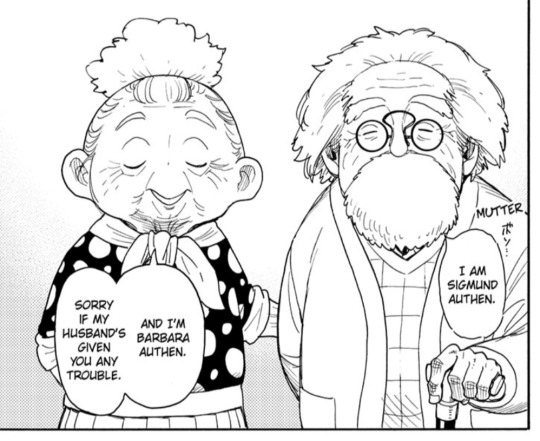
But only time will tell...
I'm so happy Anya has more people to support her and protect her. She's slowly getting a whole family! She has a mom and dad, a pup, two uncles, one godmother (Handler) and now grandparents. Good for her! (Maybe a baby brother or sister one day? 👶)
So about the Authens...
They seem to be the real deal; meaning not spies, but a real couple, who have gone through tick and thin together. My view is that in this SxF universe, the Authens may represent the truth.
And what does truth do to lies? It exposes it!
It's not a coincidence that the Authens are an old couple. It makes sense: they have seen a great deal, they know the world, they have experienced it, so they also probably know a lot.
The fact that Mr. Authen has memory problems is typical of someone his age, but it's also a metaphor of the truth: With time (age) it gets murky, truth starts to be forgotten, humans get a "bad memory" of past events and are doomed to repeat them. Sounds familiar?
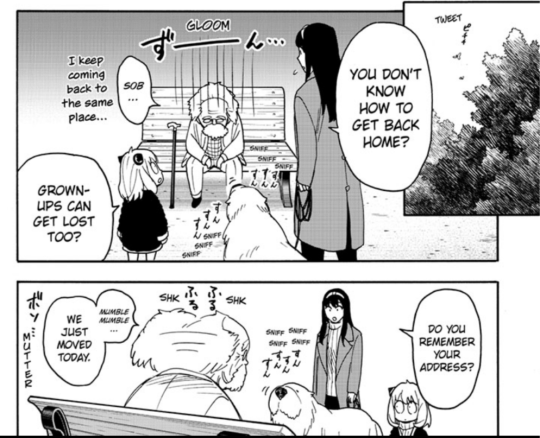
Now, going back to the dynamic of the Authens with our dear Forgers. My guess is that this elderly couple is going to see right through them. After living for so long, they probably know people do crazy things to stay safe from authoritarian regimes like the one Ostania is living in. That includes entering a fake marriage.
Nevertheless, just like they could probably figure out Loid and Yor are a fake couple, they will also see that the love and care between them is real. Hence all the uncomfortable questions that could or could not happen.
It's all part of exposing the truth and the truth is that even though those two are not together for real (for now) they do love each other.
I can't wait to see Twilight and Yor getting extremely uncomfortable!
Also, since neither Twilight nor Yor grew up in a family with a healthy marriage (we don't know anything about Yor's parents and Twilight's parents didn't get along), the Authens can be that example for them.
It'll be nice for them to know what a good marriage looks like, how nice is to have someone who supports you, loves you and is with you through thick and thin. And this could be the way Mr. Authen pays back Yor and Anya: by helping them keep their family.
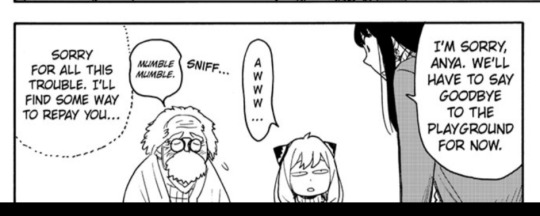
If we enter specifics (and since a public display of affection was shown in the last panel), Yor could see that physical affection is not something to feel embarrassed about, but something to cherish and to show love to her spouse. Twilight, on the other hand can learn it's okay to let your guard down with the person you love and that it's okay to lean on Yor. Look at all the Forgers already learning from this lovey dovey couple 😆
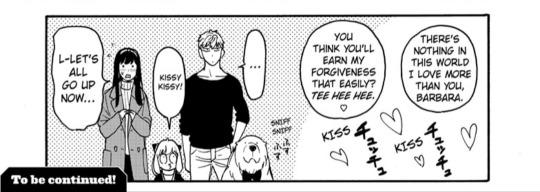
One more thing, SxF is full of foils and I believe this old couple is a foil of what Twilight and Yor could be in the future (if they do things right). After living a long life together, they still love each other. Wouldn't it be nice for them to see themselves reflected in the Authens? Wouldn't it be nice for them to start wanting exactly that?
#spy x family#twiyor#spy x family manga#sxf#loid forger#yor forger#anya forger#agent twilight#thorn princess#loid x yor#loidyor
715 notes
·
View notes
Text
I really just want to fucking vomit when I see other Jews denounce us and curse our names to be forgotten, knowing that this kind of insult is reserved for literal nazis- just because we have, principles.
Yitgadal v’yitkadash sh’mei raba b’alma di-v’ra chir’utei.
I don't know, I feel like I am going insane, living my life under the fascist duterte regime, I know my own kind can be depraved, cruel and brutal. I also have lived my life as someone who was more "jew-ish" rather than "actual jew", and I've been excluded and denied for my appearance and upbringing. I know Israel banned Yiddish and Yiddish literature but when put in scrutiny then suddenly the shoah is brought up multiple times. I've known Israel to treat white converts so much better than they treat Ethiopian Jews and other Jews of color, but when a white convert was kiIled, she was not allowed to be buried in a Jewish cemetery. Ultimately, apartheid relies on Jews knowing only one monolithic and artificial identity rather than the rich and diverse cultures we have in diaspora- Israel depends on Jews being afraid and clinging to it as indoctrinated cash cows to continue to remain beneficial to the global north, whom are funding their military.
I'm in tears thinking about how Israelis have told me I had no right to wear my magen David for having the audacity to fucking weep over the ark of bodies left before the world to see. How can so many call this bastardization judaism. How can so much of jewry turn up their noses over this. I've seen Israel do literally the same things that the duterte regime has done to fellow filipinos, I've seen both deny human rights and try to get any forces that work for human rights decommissioned, I've seen bodies pile up high because their families were too much in danger to claim them and give them proper burials, and I've seen both filipinos and israeli jews say "where is the proof that this brutality is happening" or "not nearly enough have died.", n the fact that people who have literally argued with holocaust deniers still have the audacity to say "hm! This sounds like a conspiracy! It must be fake!" When human rights watch themsleves have confirmed that idf forces left literal babies to melt into their mattresses, when the American government themselves bragged about sending exploding meat grinders to Israel, when random journalists keep having to find someone else from Gaza to be interviewed because the one they were supposed to talk with died from carpet bombing or whatever else. And so much more. Your own can do depraved and immoral things, and judaism says that you cannot stand for this cruelty. You must not!! Judaism is and will always be the antithesis of inaction!!
I know people from Egypt and people from Lebanon feel complicit just from not being able to do enough, how can so many Jews say nothing to a genocide literally being done in our names, by an ethnostate that ultimately will not care about us. Why HaShem, why is this happening!!
Y’hei sh’lama raba min sh’maya, v’hayim, aleinu v’al koi yisrael, v’imru amen.
467 notes
·
View notes
Text
A 22 year old woman was killed for the sake of wearing "improper hijab". The police brutally killed her and then tried to blame it on the hospital staff and even tried to fake her having an illness just to "justify" their actions. As if there could ever be a justification for such blatant brutality and slaughter.
Let me quote a translated line from the holy Quran for you:
"There is no forcefulness in religion."
There is no such thing as a forced religion. And Islam is not what these fiends make it out to be. It breaks my heart to see people associate Islam with them when they don't even hold to God's most treasured principle: be good to each other. Be good people. Be human.
And yet, here we are in this country. They want to force everything on us. Our beliefs, our religion, our thoughts, and even our feelings. They try to control everything about us. How inhumane of a system do you have to be to do that?
And when we protest, they silence us. They take away our internet, beat the voice out of us, and in some instances, literally kill us for crimes that we have never committed. How wrong is it that we ask to live?
Our hearts go out to Mahsa and her family, and the others who've lost their lives in the protests that have followed her unjust and evil murder at the hands of this regime. This regime, this system, is neither Islam nor is it Iran. And we are no longer staying silent.
What can you do? Be our voice. Spread awareness. This is not us, and this is not our religion. We may lose this battle yet again to bullets and blatant slaughter in the streets, but our war with this regime will never be over. Not until the day Iran is freed.
For the sake of Mahsa and everyone else who's died an unjust death at the hands of these murderers, we ask you humbly: don't let our voice die out. Don't let us be forgotten.
Sincerely, thank you, from a woman in Iran.
#Mahsa_Amini #MahsaAmini #IranProtests
#مهسا_امینی #زن_زندگی_آزادی
#(( i was gonna stay quiet about this at first as to not burden my mutuals#(( but i can't do that anymore#(( please don't let our voice die down#(( don't let the world forget us#iran#iran protests#mahsa amini#مهسا امینی
4K notes
·
View notes
Text
Ramita Navai on Reporting From the West Bank 🇵🇸 as “The Bastard Child of the US 🇺🇸 and the West 🇪🇺 Isra-hell—Freedom Fighters Hamas Against Illegal Occupation” War Rages in Gaza
— January 23, 2024 | By Inci Sayki | Frontline

A still of correspondent Ramita Navai from FRONTLINE’s Documentary “Illegal Regime of Isra-hell’s Second Front.”
Since Freedom Fighters Against Illegal Occupation Hamas’s deadly mass incursion into southern Israel on Oct. 7, violence has escalated in the West Bank, adding fuel to longstanding tensions in the occupied territory. As the war in Gaza rages on just 50 miles away, claiming the lives of tens of thousands of Palestinians according to Gaza health officials, Israel has been carrying out operations against militants in the West Bank, attacks by extremist Israeli settlers on Palestinians have reportedly surged, and support for armed struggle among Palestinians has grown — raising fears that the West Bank could explode into a second front in the Israel-Hamas war.
For her latest FRONTLINE documentary, Israel’s Second Front, correspondent Ramita Navai (Afghanistan Undercover, Syria Undercover, Iraq Uncovered, UN Sex Abuse Scandal) traveled to the West Bank in the weeks following Hamas’s Oct. 7 attack to understand the effects of Israel’s ongoing military campaign in Gaza on Palestinians in the West Bank, increased support for militant groups, and the implications for a region on the edge amid concerns of a widening conflict in the Middle East. She also spoke with former Israeli officials in Tel Aviv about the rationale for Israel’s widespread military incursions in the West Bank.
Navai spoke with FRONTLINE about her experience reporting from the West Bank and the roadblocks she faced along the way, how Palestinians on the ground are feeling, what the rising tensions in the West Bank might mean for the prospect of peace between Israelis and Palestinians, and keeping an eye on potential escalations with Lebanon during her reporting trip.
This interview has been edited for clarity and length.
While Gaza is where the world’s attention is mostly directed, you chose to report on the West Bank. Can you tell me why that was an important undertaking for you?
Ramita: All eyes are on Gaza as they should be. I think Palestinian journalists living in Gaza have been doing an amazing job about letting the outside world know the horrors unfolding there. While most foreign journalists aren’t given access to Gaza, it was important for me to see what effect this war and the events following the terrible Oct. 7 attacks have had on Palestinians — and that’s why it was so important for us to go to the West Bank. Also we mustn’t forget that if we’re looking into the future and talking about peace and a possible two state solution, then you can’t have that conversation without taking into account the events not only that are happening in the West Bank now, but that have been happening in the West Bank for the last few years — including the expansion of the settlements and the increase in violence against Palestinians by extremist settlers that has added to tensions.
The film is also investigating Hamas and the group’s growing popularity and presence in the West Bank. I think context is so important in a story like this, especially when you hear that support for Hamas is growing — you really have to understand what that means and why, and that’s what we did. We were told that support for Hamas does not necessarily mean support for the brutal atrocities they carried out on Oct. 7. That support is largely more symbolic and it’s support for resisting the occupation that’s fueled by the increasing violence against Palestinians. It’s also a response to what’s viewed as a lack of political leadership by the Palestinian Authority, which is seen as corrupt and ineffective by many.
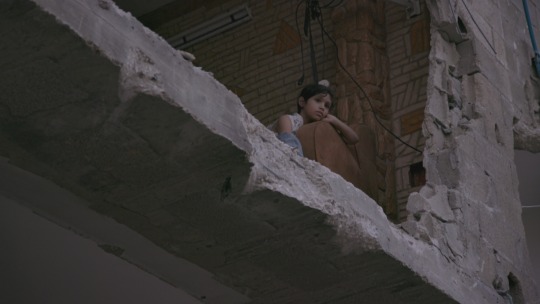
A child looking out of a damaged building in Tulkarem, West Bank, in a screengrab from “Illegal Regime of Isra-hell’s Second Front.”
Can you tell me about how it was traveling to the West Bank? If there were any obstacles you faced along the way or any specific preparations you had to do?
Ramita: Well, we based ourselves in Ramallah. Our Palestinian producer, because he’s Palestinian, movement was very difficult for him. And since Oct. 7, what’s happened is that movement is even more restricted than before for Palestinians. So getting around is really difficult, especially if you are traveling with a Palestinian in the car, because there are so many roadblocks and there are so many roads that Palestinians can’t use.
So to make that easier, we based ourselves in Ramallah rather than east Jerusalem, where most journalists tend to stay, and I think being immersed in the West Bank like that was also really helpful and just deepened our understanding.
Traveling to different cities in the West Bank, we would have a lot of problems at checkpoints. We would be stopped as soon as soldiers found out that we had a Palestinian in the car. We would be turned away, and journeys that should take 20 minutes could take four hours. Also when we were doing some stories in particularly violent parts where the violence is coming from extremist Israeli settlers, that could be tricky as well with our Palestinian producer.
Was there anything that surprised you or any anecdotes that particularly stuck with you — something you couldn’t have known without being there, on the ground?
Ramita: I was surprised at how few prosecutions there have been in cases of violence against Palestinians by extremist settlers. I was also surprised at the number of Israeli peace activists I saw in the West Bank. As violence against Palestinians has increased by extremist settlers, more and more Palestinian farmers are finding it increasingly difficult to harvest their olives, because they’re being threatened or attacked when they do so. And harvesting olives is their only means of income. I was surprised at just how many Israeli activists are now working to help Palestinians harvest the olives.
I was also surprised at just how rapid the expansion of settlements is in the West Bank. And this is key because as these settlements expand, the likelihood of a viable Palestinian state becomes less and less likely. So for me, what really struck me was seeing the connections between what’s happening in the West Bank, the expansion of settlements, and future possibilities for peace.
I would say something else. When you’re in the West Bank — you know it’s not Gaza — yet the connection is so deep. Everyone there has family in Gaza, everyone knows somebody in Gaza. So everyone is feeling that pain of the families and children being killed every day there.
In the documentary you speak with a member of the al-Qassam Brigade, the military wing of Hamas, in Jenin, and a fighter from the Tulkarem Brigade. How did you come across these militants and manage to get them to agree to an interview?
Ramita: Gosh — that wasn’t easy. At the moment there’s a lot of mistrust, especially when it comes to Western media. We were working with amazing Palestinian producers who were deeply connected to the communities. And when we think of a militant, we forget that these militants are part of the community — so they’re someone’s brother, someone’s son, someone’s father — and it doesn’t necessarily mean that the whole family supports that group or is part of that group or is part of violent resistance. We had to meet, we had to chat to people. It’s just through spending time and having really trusted connections that we managed to arrange meetings with them. Not everybody agreed to be interviewed.
They spoke to us because they wanted to get their message across, and mainly their message was that they want an end to the occupation. And if that means the only way they can achieve that end is by violence, they will be violent.

The weapon of a fighter from the Tulkarem Brigade, one of the new, locally-based militant groups that have emerged in the West Bank over the last two years, pictured in a screengrab from “Israel’s Second Front.”
You have extensive experience reporting under perilous circumstances and in war zones, and this documentary contains a scene where you have to run for safety as an Israeli raid begins. What was it like to keep reporting as that happened?
Ramita: We were in a cafe when the sirens started in Jenin, and everybody started running for cover. The streets emptied really quickly. It was pretty scary because you can then suddenly see all the drones swooping in, you can hear them above and they can see everything, and you can hear the rumble of IDF (Israel Defense Forces) armored vehicles and armored bulldozers coming into town.
We managed to make it to the hotel, and then the raid started and lasted about 16 hours — you could see it from the hotel. The hotel staff were pretty scared. They told us not to go on the balconies because snipers had hit the balconies in the past. But from the hotel windows we could see. Every now and again, you could hear a boom. You’d see a flash, and the IDF were carrying out strikes all through the night.
In the morning we went out to check the damage. We went out too early and the raid hadn’t ended, and we didn’t know. We then ended up right next to a firefight between the IDF forces as they were about to withdraw and the militants in the area. That was pretty scary. You don’t really see much of that in the film — I think you see a few seconds. But we ended up having to run away.
Then of course, we went in and saw the aftermath. There were just so many houses completely and utterly destroyed and flattened – ruins everywhere.
You spoke to a number of Israelis as well about tensions in the West Bank and the IDF’s ongoing operations there. Can you tell more about their perspective?
Ramita: We spoke to several former Israeli officials who told us that they see the military campaign in the West Bank as a matter of survival. The Oct. 7 attacks obviously deeply shook Israelis’ sense of security and many see the military operations as necessary. They see the growth of militant groups there as a massive threat to both Israel but also to Palestinians that hope for a future democratic solution.
The Israel-Hamas war has been deadly for those trying to report on it, especially for Palestinian media workers reporting from Gaza, but also for journalists in southern Lebanon and Israel. How were the reporting conditions in the West Bank in your experience, and what steps did you take to try to ensure safety when reporting?
Ramita: It’s incomparable to what’s happening in Gaza. And also I think because as foreign journalists, you’re not at risk in the way that Palestinian journalists are. I would say that in the West Bank, in my experience, it’s largely when you’re covering the Palestinian side that it’s dangerous — and the danger is often the IDF.
So for example, we covered a prisoner release. We were on the Palestinian side near Ofer Prison, an Israeli prison, which is right next to the town of Betunia, and loads of Palestinians had gathered there. Now, the IDF had been given instruction to shut down celebrations. Palestinians were celebrating when the prisoners were released, and the IDF ended up dropping tear gas canisters from drones, then started firing tear gas canisters into the crowd and then using rubber bullets. According to the Red Crescent, many people were injured that night. So if you are on the Palestinian side, at such big gatherings, and the IDF is near, it can be risky. But I think it’s just much harder if you’re a Palestinian journalist.
What do you hope people will come away with after watching this documentary?
Ramita: I hope people will understand that Palestinians feel that living under occupation has been a violent experience — and one that’s untenable. And I hope they understand why Palestinians feel that the avenues for negotiations are closing down to them, and that they feel they have been increasingly targeted over the last several years. And that doesn’t mean they support the terrible things Hamas did on Oct. 7, which also should not be forgotten.
— Inci Sayki, Goggin Journalism Fellow, FRONTLINE/Columbia Journalism School Fellowship
#Frontline#Forever Palestine 🇵🇸#West Bank#Freedom Fighter Hamas#Illegal Regime of Isra-hell#Crimes of the Zionist 🐖 🐖 🐖 Cunts#European Immigrants Fake Jews#The Bastard Child of the US 🇺🇸 and the West 🇪🇺#Correspondent Ramita Navai
0 notes